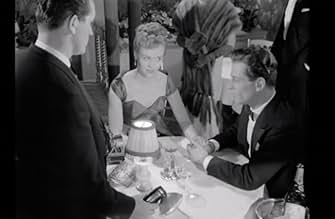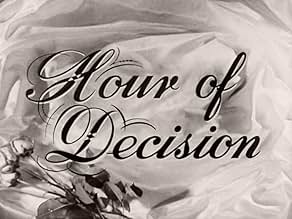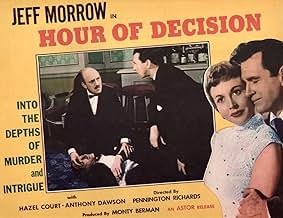An American journalist solves the mystery of an unpleasant columnist's murder and clears his own wife, one of the many suspects.An American journalist solves the mystery of an unpleasant columnist's murder and clears his own wife, one of the many suspects.An American journalist solves the mystery of an unpleasant columnist's murder and clears his own wife, one of the many suspects.
- Director
- Writers
- Stars
- Director
- Writers
- All cast & crew
- Production, box office & more at IMDbPro
Featured reviews
Things were still economically tough in 1957 Britain, as well as grey, with many cities still showing the scars of war. The film makers in their efforts to help the average working men and women escape the dullness and grind of everyday life, a plethora of cheap second feature ' B' films were made in the 50's about about glitzy London, populated with American second rate actors, and stories about murder amongst the fashionable middle classes who could afford cars, champagne and go to night clubs and hotels. There's not one authentic working class individual to trouble the audience in this pedestrian whodunnit at the nightclub! It's another cheaply made black and white 50's film - which has the usual American actor to make the film saleable to American audiences. In this case it's uncharismatic and wooden, Jeff Morrow, playing the crime reporter helping Scotland Yard track down the killer of despised & obnoxious gossip columnist Gary Bax, played by Anthony Dawson. Too much of the film is spent in talking, with hardly any action to enlighten the proceedings. Many of the night club scenes come across as unconvincing with its owner, Lionel Jeffries rejoicing in the ridiculous name of 'Elvin Main' trying, but failing badly, to put on an American accent. The dialogue is tiresome, with a storyline which gives the cast little opportunity to express any emotions. The 'Agatha Christie' style ending where the killer is identified is all so hammy! Any redeeming features? None as I can see.
Anthony Dawson is a society columnist at the London night club he has made famous. He gets up to wander the tables, then sits down. When he gets up, he collapses, dead. The police, in the person of Carl Bernard, investigate. Newly wed reporter, Jeff Morrow (playing an alien instead of fighting them in scifi flicks) offers to help, and Bernard is agreeable. Morrow has more motive than a story; his wife, Hazel Court, is a suspect, although no one knows her name; she had been Dawson's lover before her marriage, and was trying to get some letters back.
It's a well constructed mystery, with Morrow wandering around, interviewing suspects, and as is usual, everyone had plenty of motive to kill Dawson. There's also some good outdoor photography by cinematographer Stanley Pavey as Morrow wanders past several landmarks, including the Fire monument, Buckingham Palace -- with the soldiers marching past -- and Picadilly Circus. C. M. Pennington-Richards directs efficiently, with a few tics standing in for character traits. Lionel Jeffries and Michael Balfour have nice little roles.
It's a well constructed mystery, with Morrow wandering around, interviewing suspects, and as is usual, everyone had plenty of motive to kill Dawson. There's also some good outdoor photography by cinematographer Stanley Pavey as Morrow wanders past several landmarks, including the Fire monument, Buckingham Palace -- with the soldiers marching past -- and Picadilly Circus. C. M. Pennington-Richards directs efficiently, with a few tics standing in for character traits. Lionel Jeffries and Michael Balfour have nice little roles.
Despite an impressive cast list, this British murder mystery is strictly hokum, a B-picture justly forgotten by modern audiences. It tells the tale of a ghastly gossip columnist - you know, like those ones who write for The Sun - who's murdered at a posh restaurant. An investigative journalist (American star Jeff Morrow, of THE GIANT CLAW fame) decides to solve the case by going through the suspects in turn.
About the only thing this production has going for it are the cast members. There's Hammer starlet Hazel Court, as winsome as ever as the journalist's beautiful wife. Anthony Dawson is the snide murder victim. Arthur Lowe pops up in a cameo, Marne Maitland is reduced to playing a waiter, and Lionel Jeffries bags a largish role too.
Unfortunately the rest of HOUR OF DECISION is strictly routine and the murder mystery itself is consistently boring, heavily indebted to the likes of Agatha Christie. It feels sluggish, especially at the climax where all the suspects gather in the club for a final reckoning. The production values are limited and there's no incident or atmosphere to speak of, leaving this completely missable.
About the only thing this production has going for it are the cast members. There's Hammer starlet Hazel Court, as winsome as ever as the journalist's beautiful wife. Anthony Dawson is the snide murder victim. Arthur Lowe pops up in a cameo, Marne Maitland is reduced to playing a waiter, and Lionel Jeffries bags a largish role too.
Unfortunately the rest of HOUR OF DECISION is strictly routine and the murder mystery itself is consistently boring, heavily indebted to the likes of Agatha Christie. It feels sluggish, especially at the climax where all the suspects gather in the club for a final reckoning. The production values are limited and there's no incident or atmosphere to speak of, leaving this completely missable.
Apart from the first ten minutes, in which Andrew Dawson is a womanising gossip columnist. He is mesmerising and charismatic - and then he gets poisoned. There is a briefly interesting moment as Arthur Lowe plays a handwriting expert who just "knows" that some letters are written by the same person who made a sketch of Dawson on a cigarette packet. Dawson's wife is a "hysteric" - such a convenient label - who checks herself into a nursing home and hides behind a barrage of pill bottles.
The female cast wear some awful outfits, and supporting characters mumble - or else the sound is terrible. Half the dialogue is inaudible and I don't think I missed much.
The female cast wear some awful outfits, and supporting characters mumble - or else the sound is terrible. Half the dialogue is inaudible and I don't think I missed much.
Jeff Morrow was never the most engaging of screen stars, and here he is not really any different as he struggles to defend his accused wife "Peggy" (Hazel Court) from charges of the murder of a pretty odious gossip columnist. The only way he can do that is to find the real culprit, and so for seventy minutes we follow a rather well trammelled path in this not very mysterious mystery. Anthony Dawson chips in well as "Bax" (again, he only really had the one gear) and there are a few scenes with Lionel Jeffries before the denouement that, well, it was hardly a shock. It's nice to see Piccadilly Circus in the late 1950s as rationing was ending and Britain's was finally emerging from the austerity of WWII, but otherwise this is just one of those bog-standard crime thrillers that you watch and forget. The title doesn't really do it any favours either.
Did you know
- Quotes
Tony Pendleton: Mr Gary Bax was immoral, disloyal and thoroughly selfish. I calculate there are at least a dozen other men who feel the way I do, and any one of them who's half-way decent would consider that killing Gary Bax was a public service - like clearing a blocked drain.
- Crazy creditsIn the end credits Arthur Lowe's part is misspelled "Caligraphy Expert".
Details
- Release date
- Country of origin
- Language
- Filming locations
- Piccadilly Circus, Piccadilly, London, England, UK(establishing shot of London's clubland)
- Production company
- See more company credits at IMDbPro
- Runtime
- 1h 21m(81 min)
- Color
Contribute to this page
Suggest an edit or add missing content


























